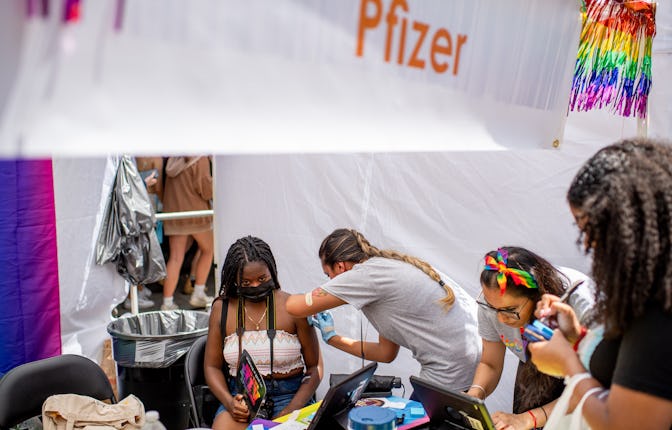Queer people may be more likely to contract COVID-19, new report finds
The LGBTQ+ community also has a higher vaccination rate than the rest of the adult population.

This week, the Human Rights Campaign (HRC) released new data that looked at the risks and impacts of the COVID-19 pandemic on the LGBTQ+ community, including those living with HIV. Among other things, the report found that LGBTQ+ folks are more likely to be vaccinated than the rest of the population — but they may also have been more likely to contract COVID-19 earlier in the pandemic.
The data, collected by Community Marketing & Insights, surveyed 1,500 LGBTQ+ adults about their experiences with and trust in vaccines, as well as concerns about the Delta variant. A staggering 91% of the LGBTQ+ adults surveyed said they were fully vaccinated; according to the CDC, only 70% of all U.S. adults fall under that category. Meanwhile, per the HRC, 21% of LGBTQ+ adults either tested positive for COVID-19 or were “pretty sure” they had it, compared to 14% of the general adult population.
While the data is limited, the HRC previously reported that queer people may be more susceptible to COVID-19 because they have higher rates of pre-existing conditions — such as HIV, asthma, and diabetes — and are less likely than non-LGBTQ+ adults to have health insurance.
The new survey also highlighted concerns about the vaccine among people undergoing hormone replacement therapy or taking medication to treat or prevent HIV, who are already at an increased risk of developing blood clots — something that has been reported as a result of the Johnson & Johnson vaccine in extremely rare cases. One in five people undergoing hormone therapy revealed they were worried about the vaccine’s potential impact on them and their therapy, while 32% of adults surveyed feared the vaccine would negatively interact with their HIV medication. The latter concern was even greater among Black and Latinx respondents — which makes sense, given the fact that those communities account for the majority of new HIV cases.
It’s worth noting the CDC has found no evidence of negative side effects from any of the vaccines on people who are on HIV medication — and despite the aforementioned concerns, nearly twice as many LGBTQ+ adults reported having a high degree of trust in the COVID-19 vaccines compared to the general population.
The pandemic has taken a serious toll on the queer community, despite high rates of vaccination, and that toll has only been exacerbated by a lack of regard from the medical establishment when it comes to addressing the unique concerns of the LGBTQ+ community. Hopefully, this data can be a step toward changing that.